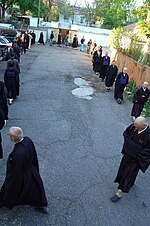
Walking meditation, sometimes known as kinhin ( Chinese: 經行; Pinyin: jīngxíng; Romaji: kinhin or kyōgyō; Korean: gyeonghyaeng; Vietnamese: kinh hành), is a practice within several forms of Buddhism that involve movement and periods of walking between long periods of sitting meditation. [1] In different forms, the practice is common in various traditions of both Theravada and in Mahayana Buddhism.
Practice
Practitioners typically walk clockwise around a room while holding their hands in a gesture with one hand closed in a fist while the other hand grasps or covers the fist ( Chinese: 叉手; pinyin: chā shǒu; rōmaji: shashu). [2] During walking meditation each step is taken after each full breath. [3] The pace of walking meditation can be either slow (several steady steps per each breath) or brisk, almost to the point of jogging. [2]
Etymology
The term kinhin consists of the Chinese words 經, meaning "to go through (like the thread in a loom)", with " sutra" as a secondary meaning, and 行, meaning "walk". Taken literally, the phrase means "to walk straight back and forth."
Research
Walking meditation has been studied to investigate whether it has potential benefits for the following health problems:
- cardiotoxicity of anthracycline chemotherapy in people with breast cancer [4]
- Parkinson's disease [5]
- chronic ankle instability [6] [7]
- balance abilities in older people with history of fall [8]
- exercise capacity and quality of life of patients with chronic heart failure [9]
- glycemic control and vascular function in people with type 2 diabetes [10]
- depression, functional fitness, and endothelium-dependent vasodilation in older people [11]
See also
References
- ^ Maezumi & Glassman 2002, pp. 48–9.
- ^ a b Aitken 1999, pp. 35–6.
- ^ "Kinhin". Empty Bowl Zendo. Retrieved April 1, 2015.
- ^ Siripanya, Saowalak; Parinyanitikul, Napa; Tanaka, Hirofumi; Suksom, Daroonwan (September 2023). "Home-Based Buddhist Walking Meditation Mitigates Cardiotoxicity of Anthracycline Chemotherapy in Breast Cancer Patients: A Randomized Controlled Trial". Journal of Integrative and Complementary Medicine. 29 (9): 562–573. doi: 10.1089/jicm.2022.0778. ISSN 2768-3613. PMID 37036793.
- ^ Mitarnun, Witoon; Mitranun, Witid; Mitarnun, Wenika; Pangwong, Wilasinee (March 2022). "Home-Based Walking Meditation Decreases Disease Severity in Parkinson's Disease: A Randomized Controlled Trial". Journal of Integrative and Complementary Medicine. 28 (3): 227–233. doi: 10.1089/jicm.2021.0292. ISSN 2768-3613. PMID 35294297.
- ^ Lapanantasin, Saitida; Thongloy, Natee; Samsee, Manatsawee; Wonghirunsombat, Natchapol; Nuangpulsarp, Norasate; Ua-Areejit, Chudmanee; Phattaraphanasakul, Phatchayanun (May 2022). "Comparative effect of walking meditation and rubber-band exercise on ankle proprioception and balance performance among persons with chronic ankle instability: A randomized controlled trial". Complementary Therapies in Medicine. 65: 102807. doi: 10.1016/j.ctim.2022.102807. ISSN 1873-6963. PMID 35093512.
- ^ Chatutain, Apsornsawan; Pattana, Jindarut; Parinsarum, Tunyakarn; Lapanantasin, Saitida (July 2019). "Walking meditation promotes ankle proprioception and balance performance among elderly women". Journal of Bodywork and Movement Therapies. 23 (3): 652–657. doi: 10.1016/j.jbmt.2018.09.152. ISSN 1532-9283. PMID 31563384.
- ^ Phoobangkerdphol, Chalida; Limampai, Patchara; Dasri, Sirinuch; Kuptniratsaikul, Vilai (April 2022). "Walking meditation versus balance training for improving balance abilities among older adults with history of fall: A randomized controlled trial". Clinical Rehabilitation. 36 (4): 538–549. doi: 10.1177/02692155211068232. ISSN 1477-0873. PMID 34931904.
- ^ Srisoongnern, Sumana; Pajareya, Kingkaew; Sriboon, Rungladda; Thanakiatpinyo, Thanitta; Chirakarnjanakorn, Srisakul; Thirapatarapong, Wilawan (2021). "Effects of Buddhist walking meditation on exercise capacity and quality of life of patients with chronic heart failure: A randomized controlled trial". Heart & Lung: The Journal of Critical Care. 50 (3): 363–368. doi: 10.1016/j.hrtlng.2021.02.005. ISSN 1527-3288. PMID 33618146.
- ^ Gainey, Atikarn; Himathongkam, Thep; Tanaka, Hirofumi; Suksom, Daroonwan (June 2016). "Effects of Buddhist walking meditation on glycemic control and vascular function in patients with type 2 diabetes". Complementary Therapies in Medicine. 26: 92–97. doi: 10.1016/j.ctim.2016.03.009. ISSN 1873-6963. PMID 27261988.
- ^ Prakhinkit, Susaree; Suppapitiporn, Siriluck; Tanaka, Hirofumi; Suksom, Daroonwan (May 2014). "Effects of Buddhism walking meditation on depression, functional fitness, and endothelium-dependent vasodilation in depressed elderly". Journal of Alternative and Complementary Medicine. 20 (5): 411–416. doi: 10.1089/acm.2013.0205. ISSN 1557-7708. PMID 24372522.
Sources
- Smith, L. (2023). 28 Meditation Statistics: How Many People Meditate? The Good Body. https://www.thegoodbody.com/meditation-statistics/
- Team, M. (2022). How Many People Meditate? Mindworks Meditation. https://mindworks.org/blog/how-many-people-meditate/
- Wise, J. (2023). Meditation Statistics 2023: Popularity, Industry & Market Size - EarthWeb. EarthWeb. https://earthweb.com/meditation-statistics/#:~:text=Meditation%20Statistics%202023-,Approximately%20200%20to%20500%20million%20people%20across%20the%20globe%20partake,reduce%20school%20suspensions%20by%2045%25.
Bibliography
- Aitken, Robert (1999). Taking the Path of Zen. North Point Press. pp. 35–36. ISBN 0-86547-080-4.
- Maezumi, Hakuyu Taizan; Glassman, Bernie (2002). On Zen Practice: Body, Breath, Mind. Wisdom Publications. pp. 48–49. ISBN 086171315X.
- Jin, Putai. "Efficacy of Tai Chi, Brisk Walking, Meditation, and Reading In Reducing Mental and Emotional Stress". doi.org/10.1016/0022-3999(92)90072-A
- Prakhinkit, Susaree "Effects of Buddhist Walking Meditation on glycemic control and vascular functions in patients with Type-2 Diabetes." Journal of Alternative and Complementary Medicine doi.org/10.1016/j.ctim.2016.03.009
- Prakhinkit, Susaree "Effects of Buddhism walking meditation on depression, functional fitness, and endothelium-dependent vasodilation in depressed elderly." Journal of Alternative and Complementary Medicine, vol. 20, no. 5, 2014, doi.org/10.1089/acm.2013.0205
- Chatutain, Apsornsawan “Walking Meditation Promotes Ankle Proprioception and Balance Performance among Elderly Women.” doi.org/10.1016/j.jbmt.2018.09.152
- Smith, Alison. “Walking Meditation: Being Present and Being Pilgrim on the Camino De Santiago.” Religions, vol. 9, no. 3, 2018, p. 82., doi:10.3390/rel9030082